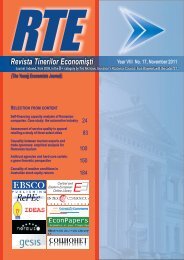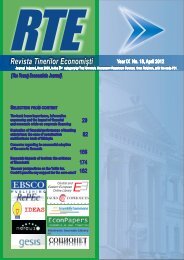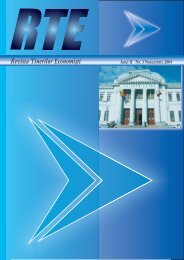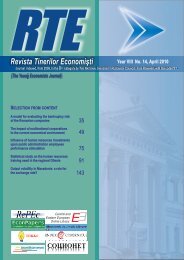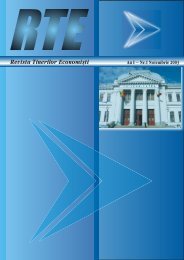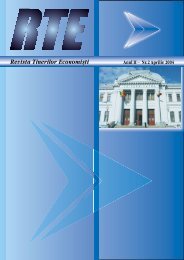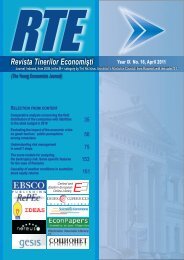Implications of change management in public administration
Implications of change management in public administration
Implications of change management in public administration
You also want an ePaper? Increase the reach of your titles
YUMPU automatically turns print PDFs into web optimized ePapers that Google loves.
F<strong>in</strong>ances - Account<strong>in</strong>g<br />
have sufficient own resources to cover any unexpected losses from credit risk; <strong>in</strong><br />
addition lack the toxic assets <strong>of</strong> banks operat<strong>in</strong>g <strong>in</strong> Romania leads to avoid<br />
<strong>in</strong>terventions funded with <strong>public</strong> money.<br />
Based on the results <strong>of</strong> the analysis <strong>of</strong> Romanian credit <strong>in</strong>stitutions, we consider<br />
that the <strong>in</strong>creas<strong>in</strong>g <strong>in</strong>volvement <strong>of</strong> banks <strong>in</strong> our country <strong>in</strong> transactions <strong>in</strong> securities,<br />
both money market and capital market, is not only necessary but also possible, creat<strong>in</strong>g<br />
synergy effects the follow<strong>in</strong>g advantages:<br />
<strong>in</strong> terms <strong>of</strong> efficient allocation <strong>of</strong> resources, banks have the ability to lower<br />
<strong>in</strong>termediation costs and improve capital allocation. Previously, banks reduce<br />
<strong>in</strong>formation costs (s<strong>in</strong>ce there are several debtors, the lower monitor<strong>in</strong>g costs) and<br />
resolve the benefit <strong>of</strong> free <strong>in</strong>formation, because loans are not traded, so banks have an<br />
<strong>in</strong>centive to acquire <strong>in</strong>formation. Subsequently, direct monitor <strong>in</strong>vestments made. On<br />
the other hand, banks can use <strong>in</strong>formation not available to others <strong>in</strong> order to extract<br />
higher pr<strong>of</strong>its from companies;<br />
<strong>in</strong> terms <strong>of</strong> risk <strong>management</strong>, banks consider a l<strong>in</strong>earized <strong>in</strong>ter-temporal risk<br />
(because <strong>in</strong>vestment banks are active <strong>in</strong> lower risk, while markets <strong>in</strong>vestors adjust their<br />
portfolios to achieve the higher yields) and perform the <strong>management</strong> <strong>of</strong> liquidity risk 2 .<br />
On the other hand, the orientation <strong>of</strong> banks to have projects less risky, makes that<br />
f<strong>in</strong>anc<strong>in</strong>g <strong>of</strong> <strong>in</strong>novative ideas (which are more risky) to have suffered 3 .<br />
Also, <strong>in</strong>volv<strong>in</strong>g <strong>of</strong> banks <strong>in</strong> transactions with securities should not be seen at<br />
small (only direct fund<strong>in</strong>g for the placement <strong>of</strong> shares and bonds), but large (extended),<br />
respectively for an efficient risk <strong>management</strong>, <strong>in</strong>clud<strong>in</strong>g as a source <strong>of</strong> <strong>in</strong>creas<strong>in</strong>g<br />
pr<strong>of</strong>its.<br />
Thus, given the structural <strong>change</strong>s occurr<strong>in</strong>g <strong>in</strong> f<strong>in</strong>ancial markets and different<br />
concepts about f<strong>in</strong>ancial <strong>in</strong>struments, we believe that bank<strong>in</strong>g features (efficient<br />
allocation <strong>of</strong> f<strong>in</strong>ancial resources <strong>in</strong> the economy, creat<strong>in</strong>g and <strong>of</strong>fer<strong>in</strong>g the market for<br />
f<strong>in</strong>ancial <strong>in</strong>struments for risk <strong>management</strong>, efficient mechanism payments, <strong>in</strong>clud<strong>in</strong>g<br />
the securities clear<strong>in</strong>g and settlement) warrant <strong>in</strong>clusion <strong>in</strong> the scope <strong>of</strong> titles, alongside<br />
the classic among other th<strong>in</strong>gs, like derivatives.<br />
An argument <strong>in</strong> support <strong>of</strong> this idea is a f<strong>in</strong>ancial <strong>in</strong>novation process (e.g.<br />
conversion <strong>of</strong> a group which is securitiz<strong>in</strong>g assets <strong>in</strong> illiquid f<strong>in</strong>ancial <strong>in</strong>struments<br />
traded on the market and credit risk segmentation and transfer risk class), which<br />
allowed banks to allocate assets more efficiently structured assets accord<strong>in</strong>g to risk<br />
categories to those who previously had no access to such a wide range <strong>of</strong> placement<br />
availability. Another argument <strong>in</strong> favor <strong>of</strong> extend<strong>in</strong>g the scope <strong>of</strong> titles is to consider the<br />
development <strong>of</strong> balance sheet and <strong>of</strong>f-balance sheet <strong>of</strong> banks evolutions. Items <strong>in</strong> the<br />
second category know most consistent dynamic <strong>in</strong> the bus<strong>in</strong>ess and br<strong>in</strong>g modern<br />
bank<strong>in</strong>g revenues <strong>in</strong>creas<strong>in</strong>gly significant.<br />
Plac<strong>in</strong>g and bank f<strong>in</strong>anc<strong>in</strong>g through debt securities and equity securities<br />
The structure <strong>of</strong> f<strong>in</strong>ancial <strong>in</strong>termediation by banks has <strong>change</strong>d, the role <strong>of</strong><br />
securities <strong>in</strong> the balance <strong>of</strong> these <strong>in</strong>stitutions is <strong>in</strong>creas<strong>in</strong>g. On the asset side, until<br />
2 Diamond, D., Dybvig, P. - “Bank Runs, Deposit Insurance, and Liquidity”, Journal <strong>of</strong> Political<br />
Economy 91 (3), 1983, pag. 401-419<br />
3 We<strong>in</strong>ste<strong>in</strong>, D., Yafeh, Y. - “On the Costs <strong>of</strong> a Bank-Centered F<strong>in</strong>ancial System: Evidence from<br />
the Chang<strong>in</strong>g Ma<strong>in</strong> Bank Relations <strong>in</strong> Japan”, Journal <strong>of</strong> F<strong>in</strong>ancial Economics, 1998, pag. 532-<br />
635<br />
23



